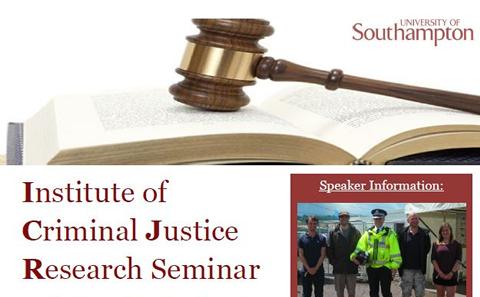Making and Breaking Barriers: Assessing the value of mounted police units in the UK Event

- Time:
- 16:00 - 17:30
- Date:
- 26 November 2014
- Venue:
- University of Southampton Highfield Campus Life Sciences, Building 85 Room 2209
For more information regarding this event, please email Professor Jenny Fleming at J.Fleming@soton.ac.uk .
Event details
The second ICJR seminar in the series with speakers Chris Giacomantonio, RAND Europe Ben Bradford, Matthew Davies and Richard Martin, University of Oxford.
While the use of mounted police (i.e. police horses and riders) can be traced back to before the advent of the modern police service in 1829, very little is known about the actual work of mounted police from either academic or practitioner standpoints. Police horses are thought to have unique operational and symbolic value, particularly in public order policing (making barriers) and community engagement (breaking barriers) deployments. They may represent a calming presence or, and potentially at the same time, an imposing threat of force. Yet, the relationship between the use of police horses and broader notions of policing by consent in the UK is presently unknown, and all evidence for these claims is anecdotal at best.
In recent years, mounted units have come under resource scrutiny in the UK due to austerity measures. Some forces have eliminated their mounted capacities altogether, while others have developed collaborative or mutual assistance arrangements with neighbouring forces. The relative costs and benefits of the available options - maintaining units, merging and centralizing mounted resources, or eliminating them in whole or part - cannot at present be assessed confidently by individual forces or by national coordinating agencies such as the Home Office, ACPO and the National Police Coordination Centre.
To address this limitation in available evidence, the Association of Chief Police Officers' Mounted Working Group commissioned a project to consider ways in which the relative value of mounted police work may be measured and understood, as well as provide evidence testing the value of mounted police in various deployment scenarios. The research team took a broad understanding of the notion of value that mirrors the ways in which the value of police work is assessed more generally including their capacities to respond to and also prevent crime and disorder, as well as their capacities for public engagement and ability to garner public trust and legitimacy.
The research undertaken for this project was multi-method and exploratory in nature. Beginning in February 2013, the project has examined mounted police in multiple deployment scenarios including neighbourhood policing, football policing and public order policing in festival and demonstration settings. This project also includes research activities designed to understand the costs of mounted policing, and a survey of senior mounted police officers in other countries to understand the potential transferability of these findings. The project reported on 19 November at an international knowledge exchange event involving police practitioners and policymakers from the UK and internationally. This presentation will provide an overview of the project findings and also reflects on the knowledge exchange experience.
The project has received funding and contributions from Avon and Somerset Constabulary, Gloucestershire Constabulary, the Metropolitan Police Service, the University of Oxford's John Fell Fund, and the Economic and Social Research Council (ESRC) Knowledge Exchange Opportunities scheme.
The project has been undertaken through the Centre for Criminology, University of Oxford in partnership with RAND Europe.
Speaker information
Chris Giacomantonio,RAND Europe,Analyst working primarily with the Communities, Safety and Justice Programme.
Ben Bradford,University of Oxford, Faculty of Law,Departmental Lecturer in Criminology
Matthew Davies,Centre for Criminology, University of Oxford,DPhil Candidate
Richard Martin,University of Oxford, Faculty of Law,DPhil Criminology